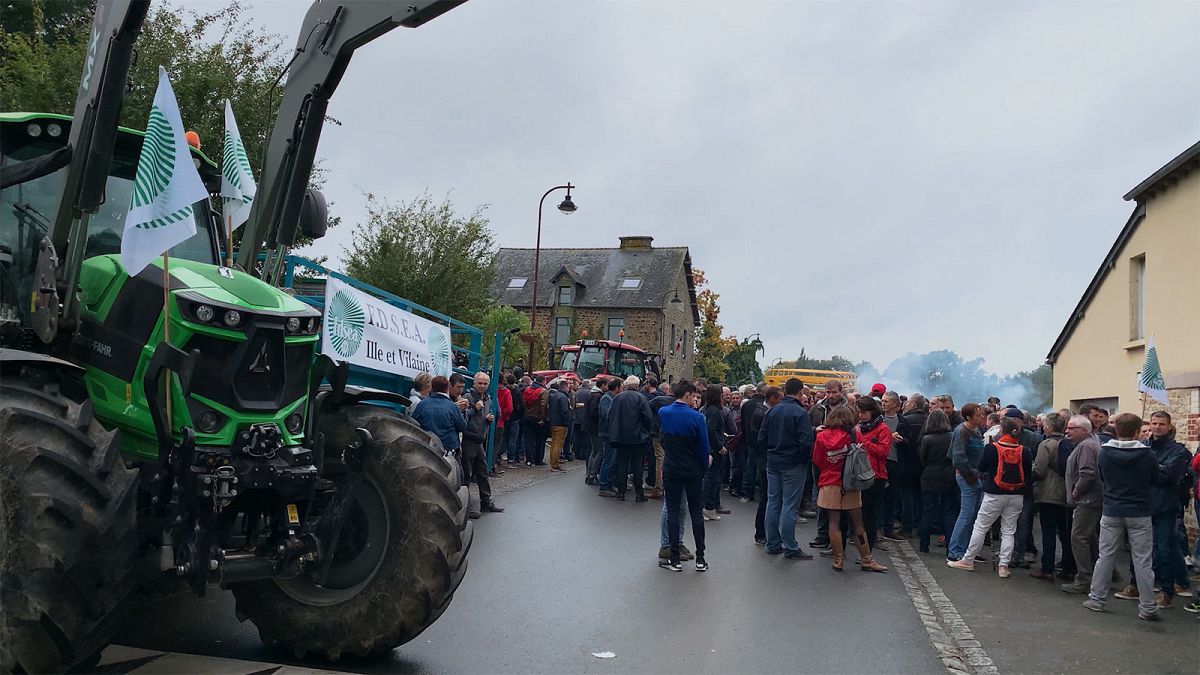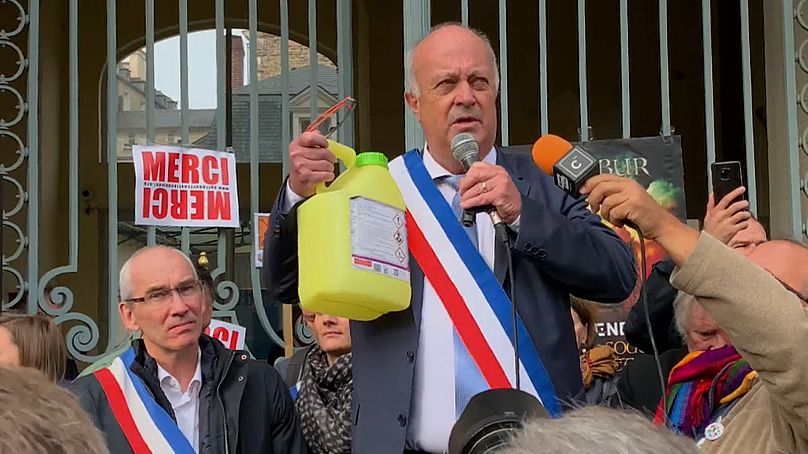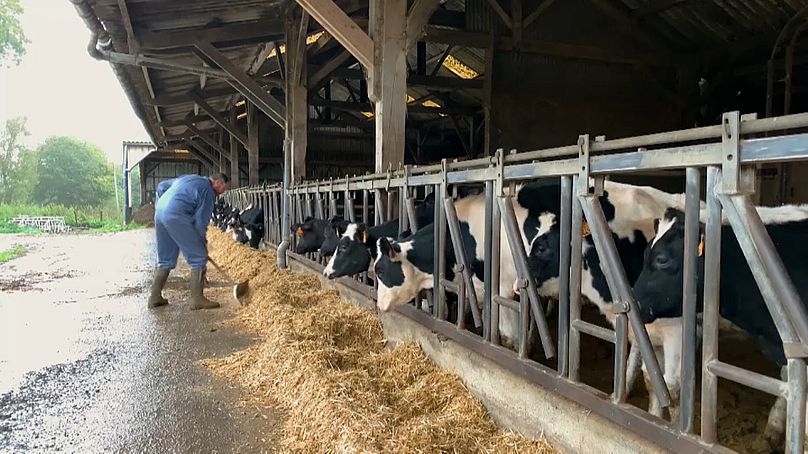France plans to introduce buffer zones between crops fields and residential areas, to comply with EU rules. The debate has become toxic in many parts of the country, where tensions run high between residents worried about their health, and farmers concerned about their future.
On a grey October morning in Rennes, the capital of Brittany in France, an unusual crowd is gathered in front of the region's administrative court.
They have come to support Daniel Cueff, mayor of the village of Langouët, summoned for having banned the spraying of pesticides on crops within 150 metres of residential housing. A measure the State says does not fall under his authority.
But he is unrepentant and believes the Republic must act to protect residents from synthetic pesticides.
"I wanted to demonstrate that there is imminent danger when pesticides are used," he explains. "And since the state is failing to do anything, we must implement ourselves the precaution principle that is in our Constitution. The way people are being poisoned is extremely serious!"
And it appears more and more french citizens agree with him, claiming these pesticides are a danger to their health. A widespread feeling in Europe.
Following Daniel Cueff's example, several French mayors have taken similar measures. Some of them had come to support him that morning, not yet aware judges would cancel his ban on pesticides a few days later.
Neither did the farmers who had gathered that same morning in the small village of Langouet.
Tensions run high between residents worried about their health, and farmers concerned about their economic survival.
To comply with a European directive, the French State has plans to introduce a minimal buffer zone between crops and residential homes. But farmers say this could kill French agriculture, and pave the way for imports.
"In many parts of France, there was a time where people were allowed to build houses everywhere," says Cedric Henry, President of the FDSEA Ille-et-Vilaine, the district branch of the country's main farming union."If buffer zones are imposed, it means that all the farms in all the municipalities will be affected. And if these areas are no longer productive, how do we make them profitable?"
This argument doesn’t go down well with many of the village’s 600 inhabitants.
Erwan Bourdon is a beekeeper in Langouet. In recent years, like many of his colleagues, he has lost many of his bee colonies - more than 60 percent last year.
He blames the loss on pesticides which he says are a time bomb.
"We know that these products are volatile and we need to understand that when they are sprayed, only between 2% and 20% of the product will be absorbed by the plant," he says. "Everything else is going to be directed into the air or into the groundwater. It will seep into the ground and it will enter the water table. So the impact can be much larger than a few metres around the field."
Banning the use of pesticides could me banckruptcy
A few hundred metres from Erwan’s beehives, Guillaume Sauvée raises dairy cows. Part of the cereals used for their food is sprayed with these products. For him and many others, not using pesticides would mean bankruptcy.
"If I have to turn to less intensive farming in the short term, with the cattle and surface that I have today, I won’t be able to feed my animals properly. Nor the population,” he claims.
Daniel Cueff knows the local farmers are distressed, and are not the ones at fault. He says solutions must be found, and residents must be protected.
"Farmers don't make a good living, they are economically fragile, unlike those who sell pesticides!" he says. ¨¨¨"It's the chemical lobby we are attacking. It is them we are really angry against. And this is a real public health problem, I would even say a question of civil liberties. People cannot accept having to breathe in certain products against their will!"
Langouët has long been known for its eco-friendly approach. Here organic food, solar energy, recycling, have long been part of the villagers' life. For them, sustainable development is a priority.
Hélène Heuré is one of the inhabitants of Langouët who had their urine tested to detect the presence of glyphosate in the body - a herbicide recognized as potentially carcinogenic by the World Health Organisation.
"We are very careful, we grow organic products, we don't use detergents, or household products, and despite all that our (glyphosate) levels are high," she explains. "The childrens' rates are the highest. So we are asking ourselves questions."
The debate reaches far beyond the borders of the village of Langouët.
Government plans buffer zone
Mathieu grows cereals a few miles away. The prospect of buffer zones between his fields and nearby houses worries him.
"There is a house on one side, more houses on the other side. If we are no longer able to spray crops, it will affect our productivity," he says.
Using increasingly precise machinery, spraying only at night, and going through regular controls, most farmers are already doing their best to protect residents says Mathieu, who believes new security measures are not justified.
He insists on showing euronews reporter Valerie Gauriat documents which he says demonstrate he is using the chemicals wisely. Among them, a certificate allow him to use pesticides, which was delivered to him after some training.
"Its proof that we don't just do whatever with them" says Mathieu. "We don't treat the crops when there is wind because there will be a drift," he says. "These are products that are costly, we don't just spread them around thoughtlessly"
Nonetheless, several farmers have been diagnosed with cancers that have been recognized as occupational diseases. And more and more residents are blaming their health problems on pesticides.
Our reporter heads to the village of Larchamp, in the Mayenne district, an hour's drive away from Langouët, to meet Catherine Fargeas.
Her life was turned upside down when the meadows surrounding her house were replaced by corn crops.
Some resident developed several disorders
Three years ago, Catherine developed several non-cancerous tumors, and numerous allergies and hormonal disorders.
Her youngest daughter has suffered from a serious joint disease for five years.
Both spend a large part of their time in hospitals.
Catherine does not have proof yet, but she and her doctors are convinced that pesticides are to blame for their diseases.
Catherine has filed a complaint against the farmer who plants the fields, and the companies hired for the crop spraying.
She also accuses the local authorities of having done nothing, aside from advising her to move out.
And she is outraged by the government's proposal to set the minimum distance between homes and the spray zones at between five and ten meters.
"I cannot accept that people, even if it's the government, can say spraying at five metres is ok," she says. "The crops are nine metres away from us, and we are intoxicated. And it's been destroying our lives."
"The most important thing for us now is to leave this place, to try and get better, knowing that here things can only get worse."
**On the first day of broadcast of our report, on the 8th of November, bans similar to the one taken by the mayor of Langouët were upheld by another court, for the mayors of two towns just outside Paris - Gennevilliers and Sceaux. A first in France, which could well set precedence for many other such initiatives.
**


